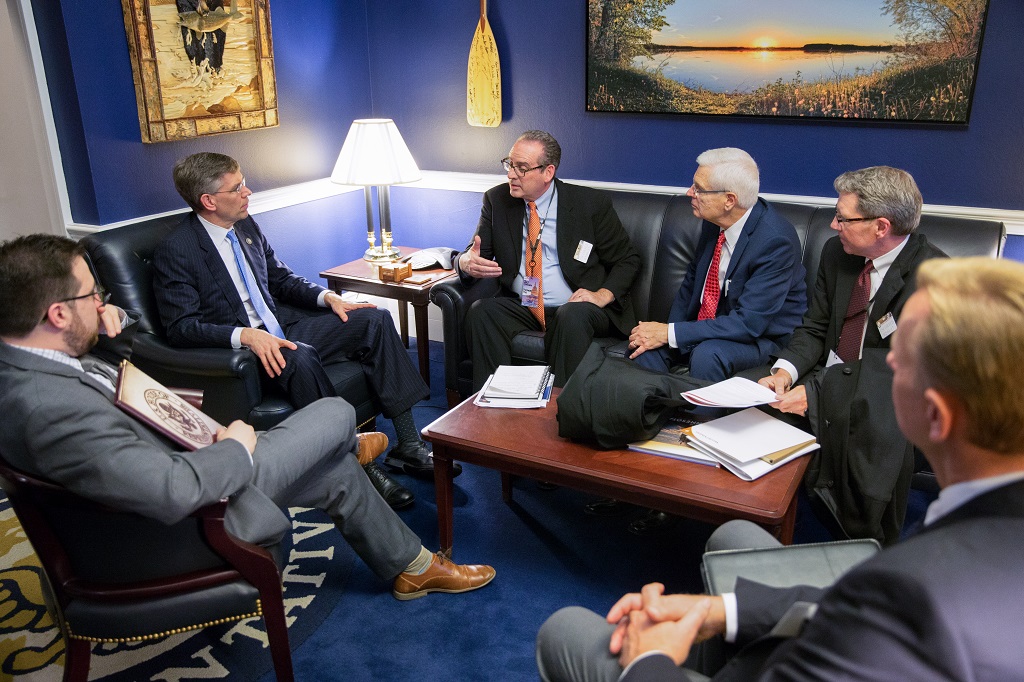Did you know? Nearly 90 percent of Congress publicly claims faith in Christ. This means that people of faith not only have significant influence with these leaders, but also an incredible opportunity to minister to them, connecting with their hearts as much as their minds. How do you do this? Through relational advocacy.
Why It Matters
Advocacy is a ministry, and because of that people remain our priority: the children around the world impacted by U.S. policy, the leaders who create those policies, as well as you – our community of advocates. This focus on people originates from four foundational principles of advocacy:
Principle #1: Poverty has spiritual roots that include broken relationships between the powerful and the powerless.
Principle #2: Our democracy is a gift from God to steward in the restoration of these broken relationships.
Principle #3: God calls us to hold government leaders accountable, while also praying for them, honoring their position and engaging them respectfully, even if we disagree with some of their perspectives.
Principle #4: God equips those he calls and acts in partnership with us to move the hearts of those in power.
Relational engagement with our leaders uplifts the stories of the oppressed, recognizes the burdens of power, and sustains our own souls for the long-term investment advocacy requires. It is not only an effective way to change policy – it also keeps us faithful to Christ’s concern for each of us involved in the process.
Our Goals
One goal of relational advocacy is to extend the presence of Christ to our leaders. Simple acts of prayer, encouragement, and kindness can nourish their spirituality and, in turn, strengthen their ability to lead in a way that honors God, with integrity.
Another aim is to promote measurable change for children around the world. One way to do this is to ensure U.S. foreign assistance funding remains robust and to pass key legislation that helps address the root causes of global poverty.
How It Works
Relational advocacy approaches politicians as partners – not targets – recognizing they are created in God’s image with a desire to do good in their public service. To do this, it is necessary to form sincere relationships with members of Congress and their staff over time.
It’s much easier than you might think: approximately two face-to-face meetings each year, combined with timely personal emails and phone calls, can create a relationship where the office knows you by name, responds to your requests eagerly, and even asks you for help and prayer. It’s not necessary to understand the nuances of foreign policy to make a difference. Simply share your heart for those in need and help your representatives take supportive actions – the same way you support or encourage a friend – and you’ll make a meaningful difference in the lives of children around the world.
Build Your Skills
To start building a relationship with your members of Congress, learn more about them. Write down what you learn, using these helpful steps.
- Identify your representatives. We each have three federal legislators who represent us – two U.S. senators and one House representative. To find your two senators, visit senate.gov and find your state from the drop-down menu at the top of the page titled “Find Your Senators.” To find your House representative, visit www.house.gov and enter your zip code in the search box provided in the top right corner.
- Visit their website. Each member of Congress has their own website where they share their biography, issues they care about, press statements, and their contact information. You can also check their Wikipedia page or other search results for more about their history and activity in your state and community. Another tool is govtrack.us, which allows you to see committee assignments, district maps, voting records and other legislators in the state.
- Start a habit this month of praying regularly for your members of Congress, sincerely and by name. Create a simple prayer card and place it where you will see it often, tie a string around your wrist or print their photo – get creative!
Photo: Randy Tift, Rich Stearns, Joel Johnson (orange tie), Jeff Moes (blue tie) and Mike Ayres (red tie, glasses) meet with Congressman Erik Paulsen in his office and outside of the House floor in the United States Capitol during the World Vision Pastor and Influencer Advocacy Summit in Washington, D.C. on Wednesday February 1, 2017. © 2017 World Vision/ photo by Garrett Hubbard



What a positive message! Thank you!
This does work. Through prayer, sharing my views and concerns on current issues, and being fervent, a relationship has been given to me with the representative of my district in which he has reached out to me a few times over the last year. Praise be to God Most High!!
I will include my two senators and my congressman in my prayers.
These are cultures that would really change the fate of the children of the dark continent- Africa , leadership and the oppressed seem not to have a relationship and any attempt to create ,one initiated by the oppressed is usually interpreted as an attempt to overthrow and defy the government of the day…
However we will continue to find sustaining relations with leadership that will help to appreciate and understand that we pray for them that God gives them strength to do his Will not ours, nor theirs….